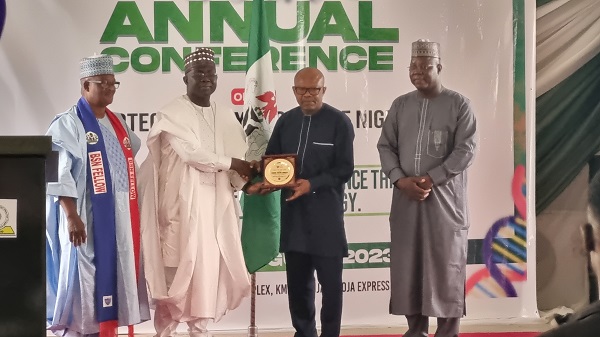
The Minister of Innovation, Science and Technology, Chief Uche Nnaji has rallied members of the Biotechnology Society of Nigeria and other pertinent stakeholders to devise inventive solutions to Nigeria’s food security challenges.
Nnaji said the directive aligns with the mandate of President Bola Ahmed Tinubu’s ‘Renewed Hope’ agenda for the nation. He underscored the significance of climate-smart solutions and precision agriculture in augmenting productivity and mitigating food instability.
During the 35th annual conference of the Biotechnology Society of Nigeria (BSN) in Abuja, held on Monday, the minister emphasised that the dynamic global landscape warrants strategic responses. Emerging technologies like synthetic biology, artificial intelligence and tissue engineering will continue to hold transformative implications for crops and livestock agriculture in the future.
He stated, “Unleashing the potential of these technologies for food security demands substantial investments in research and development, along with regional and international collaborations. Integrating technology foresight and assessment will stimulate agricultural innovations”.
Represented by the ministry’s permanent secretary, James Sule, Nnaji urged members of BSN and other stakeholders to engineer inventive strategies that can effectively address the pressing concern of food security, aligning with the President’s renewed hope agenda for Nigeria. Nnaji also advised the nation to invest in foundational scientific capabilities, particularly research and development. He highlighted that embedding innovation, science and technology into daily life is pivotal for achieving development objectives across all sectors of the economy.
Addressing the conference, the president of the Biotechnology Society of Nigeria (BSN), Prof. Mohammed Yerima outlined the conference’s objective—to establish a foundational understanding of scientific matters related to food and nutrition security, healthcare, environmental well-being and cleaner surroundings. He highlighted the pivotal role of genome editing in enhancing food crops and animal breeding, considering its potential to resolve various challenges in agriculture and health.
Yerima stated, “The chosen theme for the conference, ‘Improving Nigeria’s Economic Resilience Through Innovative Biotechnology,’ is timely, given the current economic crises. Hunger is rampant, life-threatening diseases are plaguing humanity, and environmental pollution is rampant”.
He expressed optimism that the discussions and recommendations emanating from the conference would profoundly impact scientific understanding regarding food security, healthcare, environmental well-being and cleanliness.
Yerima emphasised the importance of value addition to agricultural produce through modern biotechnology. He pointed out that while farmers utilise resources like rainwater and carbon dioxide to cultivate crops, scientists can elevate these resources’ value. Nutritional enhancement of food crops through modern biotechnology is a tangible avenue for addressing these challenges, Yerima asserted.
He also acknowledged the crucial role of collaborations, as evidenced by the society’s partnerships with various organisations and government agencies to create synergy. Yerima shared numerous instances of such collaboration and their potential to drive positive change in the nation’s economy.
The chairman of the local organising committee (LOC) for the event, Dr. Andrew Iloh highlighted the conference’s significance in fostering interdisciplinary collaboration, idea exchange and nurturing the upcoming generation of biotechnologists. He characterised biotechnology as a realm that holds the key to transformative change across healthcare, agriculture and economic sustainability.
Iloh encouraged collective efforts to leverage biotechnology’s power in tackling challenges head-on, envisioning a brighter, healthier and more sustainable future.
The director-general of Sheda Science and Technology Complex (SHETSCO), Prof. Paul Onyenekwe illuminated the harmonious fusion of biology, technology and human ingenuity in biotechnology. He emphasised that innovation has consistently driven humanity’s progress, serving as a catalyst for groundbreaking discoveries. Biotechnology, with its capacity to unravel genetic mysteries, engineer climate-resilient crops and develop sustainable solutions, stands at the forefront of innovation’s impact.
Onyenekwe stressed the need to approach biotechnology ethically and responsibly, protecting individuals’ rights, dignity and privacy while ensuring equitable access to these transformative technologies worldwide.
In conclusion, the call to action by Nnaji resonates as an impetus for the Biotechnology Society of Nigeria and related stakeholders to galvanise innovative approaches to address the nation’s food security challenges. The conference stands as a pivotal platform for fostering collaboration, sharing ideas, and shaping the trajectory of biotechnology’s role in Nigeria’s economic resilience and sustainable development. Through embracing innovation and ethical considerations, Nigeria can harness biotechnology’s potential for the betterment of society, healthcare and the environment.


